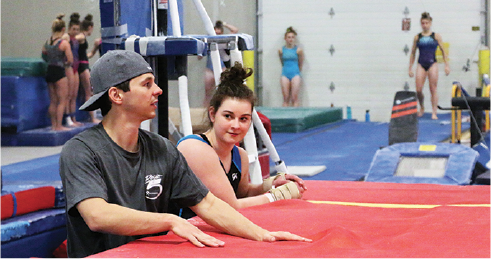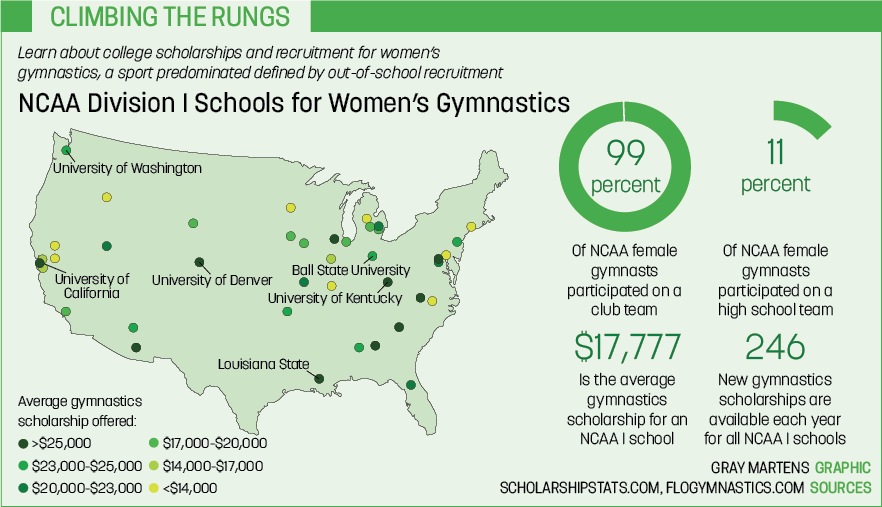
Gymnastic COMMITMENT:
Gymnast and senior Hadyn Crossen practices her routine on the bar with her group.
Crossen said that her coaches helped her understand what each college and university had offered when they had started giving offers to her. She said she ended up committing later than most other gymnasts to keep her options open.
For gymnast and senior Hadyn Crossen, gymnastics started being a big part of her life at age two, when she started the sport. Flash forward to middle school, and colleges were looking at her. Crossen now sits with a scholarship to Eastern Michigan University, but she said the process is different from school sports.
She said, “It’s a little bit different from most sports. It starts pretty young. Almost in eighth grade I’ve had some friends commit to colleges on full rides. Generally, the coaches contact either our club coaches or when you get to your junior year in September, they can contact you personally. They usually just come and watch you practice or watch your competitions, and watch videos on YouTube to try to keep up with your practices and how you’re doing. If they’re interested in you, they’ll ask you to come out and visit their school, and depending on how they like you or how the visit goes, then they might offer you a spot or a scholarship.”

GYMNASTIC COMMITMENT:
Senior and gymnasts Crossen talks to one of her coaches about her form and what to improve during her practice. Crossen said that her coaches helped her understand what each college and university had offered when they had started giving offers to her. She said she ended up committing later than most other gymnasts to keep her options open.
Gymnastics is not the only sport that has a different college recruitment process than school sports. According to James Yuska, hockey player and junior, hockey is not an IHSAA sport and the scouting process is different. Yuska said there is more to getting to the college level than there is for school sports.
“In other sports, you just go from high school sports to college sports usually, but in hockey you have to play high school and a travel team, and then college,” Yuska said.
Athletics Director Jim Inskeep explained the difference in college scouting between school and non-school sports as a matter of the opportunities college coaches have to see the players. According to Inskeep, sports like soccer that have club teams and school teams have more opportunities to be seen.
Inskeep said, “College coaches will reach out a lot of the time and say, ‘Who do you have that we might be interested in?’ or sometimes those college coaches go to a showcase, whether that be baseball, softball, soccer, just as examples, and they see a lot of different kids. They know what the top travel programs are, and that’s where they start making their list from there, and then they have that contact with the high school coach. Sometimes the first point of contact is the high school coach, sometimes it’s the travel coach. You would hope that all those work together, though, to help identify the best kids and give them an opportunity to play at the next level if they want.”
Crossen said one of the biggest differences from gymnastics scouting is the age it begins. She said in gymnastics, scouting starts earlier.
“I was getting scouted by bigger schools really when I was in eighth grade. I got invited out to a lot of schools, but I didn’t want to commit that early in my career just because you never know what could happen with injuries or schools or scholarship money or any of that. I really considered committing to a school sophomore year, which is still pretty early compared to most sports, but that was when I committed,” Crossen said.
According to Inskeep, this difference in when scouting starts is due to development. Inskeep said in sports like football, recruitment starts later to let the athletes develop.
Inskeep said, “I think the recruiting takes a lot of different paths these days, especially when you think about how early some of them start, or how late some of them start. (In football), recruiting starts later because of development. To think about some of the eighth grade and ninth grade kids that you see in other sports, where there are divisions definitely in talent and in divisions in how kids are performing, it starts earlier.”
Crossen considered committing to a school when she was a sophomore, and she said it came down to which one felt like the most comfortable fit.
She said, “I visited a few schools before I committed just to see what the right fit was between coaches, facilities and the money that they were going to give. My decision was definitely based on how homey it felt and how comfortable I felt there.” Gray Martens
Gray Martens


































![British royalty are American celebrities [opinion]](https://hilite.org/wp-content/uploads/2024/03/Screenshot-2024-03-24-1.44.57-PM.png)


















![Review: “Suits” is a perfect blend of legal drama and humor [MUSE]](https://hilite.org/wp-content/uploads/2024/04/unnamed-1.png)
![Chelsea Meng on her instagram-run bracelet shop [Biz Buzz]](https://hilite.org/wp-content/uploads/2024/04/IMG_2446-1200x838.jpg)
![Review: Quiet on Set: The Dark Side of Kids TV is the long awaited exposé of pedophilia within the children’s entertainment industry [MUSE]](https://hilite.org/wp-content/uploads/2024/04/unnamed.jpg)
![Review: “The Iron Claw” cannot get enough praise [MUSE]](https://hilite.org/wp-content/uploads/2024/04/unnamed.png)
![Review: “The Bear” sets an unbelievably high bar for future comedy shows [MUSE]](https://hilite.org/wp-content/uploads/2024/03/unnamed.png)
![Review in Print: Maripaz Villar brings a delightfully unique style to the world of WEBTOON [MUSE]](https://hilite.org/wp-content/uploads/2023/12/maripazcover-1200x960.jpg)
![Review: “The Sword of Kaigen” is a masterpiece [MUSE]](https://hilite.org/wp-content/uploads/2023/11/Screenshot-2023-11-26-201051.png)
![Review: Gateron Oil Kings, great linear switches, okay price [MUSE]](https://hilite.org/wp-content/uploads/2023/11/Screenshot-2023-11-26-200553.png)
![Review: “A Haunting in Venice” is a significant improvement from other Agatha Christie adaptations [MUSE]](https://hilite.org/wp-content/uploads/2023/11/e7ee2938a6d422669771bce6d8088521.jpg)
![Review: A Thanksgiving story from elementary school, still just as interesting [MUSE]](https://hilite.org/wp-content/uploads/2023/11/Screenshot-2023-11-26-195514-987x1200.png)
![Review: When I Fly Towards You, cute, uplifting youth drama [MUSE]](https://hilite.org/wp-content/uploads/2023/09/When-I-Fly-Towards-You-Chinese-drama.png)
![Postcards from Muse: Hawaii Travel Diary [MUSE]](https://hilite.org/wp-content/uploads/2023/09/My-project-1-1200x1200.jpg)
![Review: Ladybug & Cat Noir: The Movie, departure from original show [MUSE]](https://hilite.org/wp-content/uploads/2023/09/Ladybug__Cat_Noir_-_The_Movie_poster.jpg)
![Review in Print: Hidden Love is the cute, uplifting drama everyone needs [MUSE]](https://hilite.org/wp-content/uploads/2023/09/hiddenlovecover-e1693597208225-1030x1200.png)
![Review in Print: Heartstopper is the heartwarming queer romance we all need [MUSE]](https://hilite.org/wp-content/uploads/2023/08/museheartstoppercover-1200x654.png)























![Review: Ladybug & Cat Noir: The Movie, departure from original show [MUSE]](https://hilite.org/wp-content/uploads/2023/09/Ladybug__Cat_Noir_-_The_Movie_poster-221x300.jpg)

![Review: Next in Fashion season two survives changes, becomes a valuable pop culture artifact [MUSE]](https://hilite.org/wp-content/uploads/2023/03/Screen-Shot-2023-03-09-at-11.05.05-AM-300x214.png)
![Review: Is The Stormlight Archive worth it? [MUSE]](https://hilite.org/wp-content/uploads/2023/10/unnamed-1-184x300.png)

